Jackson’s story
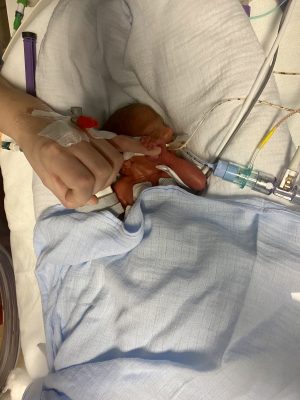 20-month-old Jackson has beaten the odds more than once in his little life. His mum, Ceri’s waters broke at just 21 weeks, which is three weeks before a pregnancy is officially considered as viable. Though Ceri didn’t go into labour straight away, she and Jackson’s dad, Ady were advised by one doctor that if her amniotic fluid failed to replenish by the time she reached 24 weeks that they should consider a termination of the pregnancy as Jackson’s lungs were unlikely to inflate when born. Ceri’s waters didn’t replenish but Ceri and Ady decided to continue with the pregnancy anyway.
20-month-old Jackson has beaten the odds more than once in his little life. His mum, Ceri’s waters broke at just 21 weeks, which is three weeks before a pregnancy is officially considered as viable. Though Ceri didn’t go into labour straight away, she and Jackson’s dad, Ady were advised by one doctor that if her amniotic fluid failed to replenish by the time she reached 24 weeks that they should consider a termination of the pregnancy as Jackson’s lungs were unlikely to inflate when born. Ceri’s waters didn’t replenish but Ceri and Ady decided to continue with the pregnancy anyway.
The pregnancy continued for another two vital weeks then Ceri went into labour and Jackson was born by emergency c-section. At 26 weeks, babies are usually given around a 80% chance of survival. For Jackson, whose growth had been hindered by the loss of amniotic fluid, the odds of survival were lower.
At birth, Jackson was intubated and taken to the neonatal intensive care unit where he stayed for three months. Though there were many different scares during that period, the main issue for Jackson was his underdeveloped lungs. He spent weeks bouncing back and forward between high levels of breathing support and less invasive kinds until finally he was well enough to go home on the lowest form of oxygen support.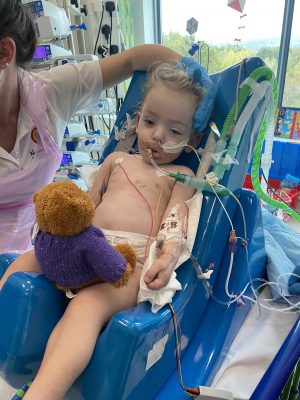
As Jackson was particularly vulnerable, parents Ceri and Ady kept him away from potential bugs and infections which, as this was during various COVID 19 lockdowns, wasn’t too hard. Shortly before his birthday in March 2022, Jackson came off oxygen completely. His parents felt relieved and finally able to relax a little bit.
Jackson picked up a few common viruses that Spring but recovered quickly. By September, Ceri felt it was safe to return to work and put Jackson in nursery a few days a week. Shortly after, Jackson caught two viruses on top of each other and this time, failed to fight them off.
After all they had been through at the beginning of their son’s life, seeing Jackson struggling to breathe was frightening for Ceri and Ady and they took him straight to the local hospital where he was assisted with oxygen. But Jackson’s condition continued to deteriorate and within four days, he was in paediatric critical care at the Noah’s Ark Children’s Hospital for Wales, fighting for his life. This time, not even a ventilator, which takes over the action of breathing completely, was enough. Jackson was put on an oscillator which maintains a constant pressure to keep the lungs permanently open. At certain points, Jackson was on 100% oxygen and even then, he was failing to maintain his saturation levels.
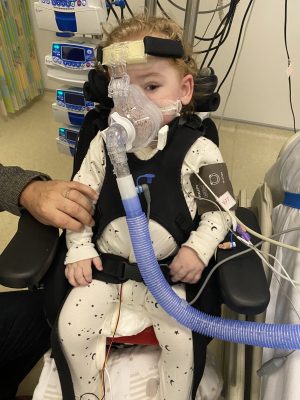 Four weeks into their stay on PCCU, Ceri and Ady were taken off the ward in to a side room and shown a number of Jackson’s chest X-rays. The respiratory and PCCU consultants explained that things were very bad and that they had done everything they possibly could for Jackson. They weren’t giving up but all that could really be done now was to watch, wait and hope.
Four weeks into their stay on PCCU, Ceri and Ady were taken off the ward in to a side room and shown a number of Jackson’s chest X-rays. The respiratory and PCCU consultants explained that things were very bad and that they had done everything they possibly could for Jackson. They weren’t giving up but all that could really be done now was to watch, wait and hope.
One night, Ady and Ceri received a call that every hospital parent dreads. Jackson was crashing. They were told to get there fast and call any family member they wanted to attend with them. When Ceri and Ady arrived, the crash team were surrounding Jackson’s bed. For what felt like hours, the parents watched as the emergency physiotherapy team worked relentlessly to clear Jackson’s chest. Finally it worked and he stabilised.
Still determined not to give up on Jackson, one of his consultants suggested a type of nebuliser usually used in cases of cystic fibrosis. Miraculously it started to work and Jackson’s condition gradually improved over the next couple of weeks. Jackson was extubated and able to go on CPAP – a less invasive form of breathing support. Ceri and Ady say that seeing their son come off the ventilator and go from strength to strength over the days that followed was an almost indescribable feeling of joy and relief.
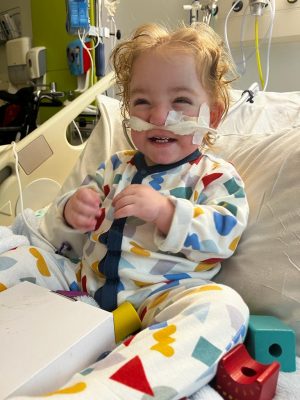 By November, Jackson was well enough to go down to Island ward to continue his recovery. As he’d been on strong sedatives for so long, Jackson was having withdrawal symptoms that needed to be managed carefully. He’d also lost a lot of muscle mass from being kept still for so long so the physiotherapy team worked with him daily to regain his strength. Gradually, by mid December, everyone was feeling optimistic enough to say that Jackson would be home for Christmas.
By November, Jackson was well enough to go down to Island ward to continue his recovery. As he’d been on strong sedatives for so long, Jackson was having withdrawal symptoms that needed to be managed carefully. He’d also lost a lot of muscle mass from being kept still for so long so the physiotherapy team worked with him daily to regain his strength. Gradually, by mid December, everyone was feeling optimistic enough to say that Jackson would be home for Christmas.
And that’s how it looked until, three days before, Jackson tested positive for RSV, a respiratory virus that that infects the lungs and breathing passages.
Ady says: “It felt like a real kick in the teeth after getting so close but we had no option but to move on and try to make the best of a Christmas in hospital for Jackson. But sadly he just got worse over the following days and on Christmas morning, Jackson took a dramatic turn for the worst and was rushed to PCCU and put back on the ventilator. I can only describe that feeling of being back in that situation as devastating.”
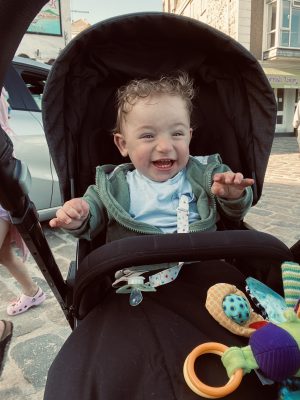 Fortunately this time, Jackson’s respiratory team knew what worked and after another two frightening weeks, he was well enough to come off the ventilator and return to Island ward. And that’s where he stayed until at the beginning of February, Jackson was finally well enough to go home.
Fortunately this time, Jackson’s respiratory team knew what worked and after another two frightening weeks, he was well enough to come off the ventilator and return to Island ward. And that’s where he stayed until at the beginning of February, Jackson was finally well enough to go home.
Ceri and Ady can never be 100% confident that Jackson won’t need to be admitted to hospital again in the future but for now they’re just delighted to be home, doing the normal things that other people take for granted like taking the dog for a walk and sleeping in their own beds. They say they are overwhelmed with gratitude to all those people who helped to save their son’s life more than once and they are eternally grateful to the dedicated teams on PCCU and to the staff on Island ward who helped Jackson continue his recovery. Ceri says ‘This experience is every parent’s worst nightmare but we feel so lucky to have such an amazing children’s hospital close to our home. Jackson became really fond of many of the staff there and we can’t thank them enough for bringing the smile back to our baby boy’s face.”







